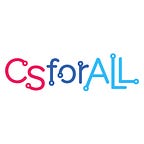Celebrating Identities and Deconstructing Power in CS Education
Moving between Black History month and Women’s History month, and embracing the complex intersections between them has given one educator moments to reflect on how identity can be a vehicle that drives and liberates us.
It’s bewildering how identity can be empowering and disempowering, personal and impersonal at the same time. If I (Ariam Mogos) were to use myself as an example, my identities of Black, woman and first generation have all been an immense source of both pride and pain. These identities have kept harmful dominant narratives intact that have shaped my life experiences, and in turn they’ve been my lens to understand the world and how I hope to see it change. Moving between Black History month and Women’s History month, and embracing the complex intersections between them have given me moments to reflect on how identity can be a vehicle that drives and liberates us, and a tool to oppress us in ways we might be completely unaware (and unfortunately accept). It’s never been a more important time for people like me and educators of all backgrounds to understand how these dynamics affect our society and students, particularly as it relates to technology.
“One key reason that standpoints of oppressed groups are suppressed is that self-defined standpoints can stimulate resistance.” -Patricia Hill Collins (Black feminist scholar)
Technology and computing can act as a platform for self-expression. This can happen through designing an animation with Scratch, making a digital collage, or building a game with Python. An alarming aspect of computing is how it is being used to assign values to socially constructed identities (like race and gender) in order to reinforce systemic inequity. Facial recognition software, AI recruiting algorithms and other harmful technologies are disproportionately affecting Black and Brown communities, women and other groups of people. Computing should never be used as an instrument to oppress non-dominant groups, and yet our daily news headlines illustrate that it’s a growing phenomenon.
We don’t have to accept this or contribute to it. Educators can play a powerful role in combating this trend.
How might we create computing resources and practices which support our self-expression, and deconstruct the power structures that attempt to suppress and define us?
I’ve been lucky to work on two diverse initiatives that are wrestling with this question. I wanted to share brief snippets about them with the CSforALL community, and put out a call to action to participate in both:
Stanford d.school REP| Magazine
Not everyone’s view of the world or experience is represented in technology. This is a result of who is building it and who has access to the concepts and tools. At the Stanford d.school, we’re working on a special project called REP|, a hands-on magazine for young people that immerses them in emerging technologies through analog play. REP| magazine aims to democratize access and participation to the concepts underpinning these technologies. It also supports students’ understanding of how their positionally (shaped by identity and social status) as designers influences the tools they put into the world, and the potential positive and negative implications on society. The magazine will explore AI, blockchain, synthetic biology, the internet of things and more. To learn more about REP magazine’s release date, join our mailing list.
The School of Intercultural Computing
Sometimes axes of difference are imposed, not entirely self-chosen. The very axes serve to sustain hierarchy and power. At the School of IC, we apply computing concepts and tools to help K-12 students see and de-‘code’ discriminatory structures. Through CS concepts, young people and educators externalize social constructs like race, reflect on how they can harm our communities, and imagine futures without their constricting grasp (rather than continue to recreate them). We take a playful learning and project-based approach to balance critical reflection and creativity. One tool that we’ve created to facilitate this process is ‘cultural algorithms,’ or writing down social rules and scripts as pseudocode. We recently ran a workshop called Birdcraft where students interrogated caste systems by altering lines of algorithms. To learn more about our testing sessions and resources, sign-up here.
Throughout Black History month and into Women’s History month, we celebrate the accomplishments and struggles of individuals and communities who have made the world more just. I hope we can also celebrate and honor them by reflecting deeply on every aspect of our programs, curriculum and teaching practice. Computing has a place in justice education, and together we can fully realize it.
About the Author: Ariam Mogos (she/her) is a Pan-Africanist, educator, learning technologist and Stanford d.school K12 Futures Fellow. She also runs the School for Intercultural Computing, an experimental community which examines the intersections between culture, code, play and design in K12 Education to advance social justice.
